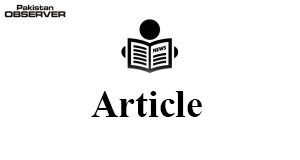Munawar Ali Mahar
TO the relief of whole world, the American electorate has chosen Democrat Joseph Robinette Biden as the 46th President marking the end of the political aberration voted into power in 2016. The electoral triumph of Biden over Trump is illustrative of the institutional vitality and resilience of American system enabling the son of a car salesman to become the head of the most powerful state. On internal and external fronts, Trump is leaving behind a toxic legacy for the succeeding President facing the Herculean task of picking up the pieces of racially-fractured nation confronted by an unprecedented public health crisis caused by the COVID-19. Since the US is the largest economy and the mightiest military power on the planet, the presidential election results create world-spanning geopolitical ripples as it is the most consequential electoral outcome with respect to its impact on the international system. Now the million-dollar question arises as to what Biden’s victory means for Pakistan’s domestic politics and the Pak-US ties.
As a matter of the fact, the President-elect is not any stranger to Pakistan as he closely worked with the country during his stint as the Vice President under Obama. Biden was the member of the high-powered delegation that visited Pakistan to observe the parliamentary elections on 18 February2008. Subsequently, he sought to reorient the trajectory of the bilateral ties by lobbying for shifting the focus and thrust of Pak-US ties from traditional security to human security. Eventually, he along with Senator Richard Lugar piloted the Enhanced Partnership Act with Pakistan 2008 calling for $1.5 billion per year in non-military aid for economic development. Throughout his tenure, Biden considered Pakistan a key American partner. In recognition of his support for Pakistan, he was honoured with the second-highest civilian honour ‘Hilal-e-Pakistan’ (Crescent of Pakistan) in 2008. As the Vice President, his last visit to the country was on January 12, 2011. Thus, he is fully familiar with the labyrinthine Pak-US relations.
Domestically, he would like to engage more with the civilian leadership that sought to cultivate personalized rapport with Donald Trump rather than creating space for institutionalised engagement with the US. The outgoing president opted for silence when the government chose to crack down on the dissidents, political opposition and media in Pakistan. Given Biden’s and his vice president Kamala Harri’s sensitivity to human rights, the heavy-handed tactic against the opponents of all shades, may not go uncensured by the incoming US Administration. The incoming President is directly acquainted with the key political actors of the Pakistan Democratic Movement (PDM).This adds a new dynamic to the ongoing political tug of war in the country. What remains to be seen is how the opposition gains political mileage out of the change in the Oval Office. On the foreign policy front, Afghanistan will continue to provide a convergence point for both the countries. As he has been opposed to the prolonged US military footprint in the war-ravaged country so he will push ahead with the Trump’s Afghan policy of negotiated settlement and the eventual US military disengagement. To that effect, Pakistan’s role is key and will be utilised by the new US President who may dangle the carrot of some military aid to Islamabad, suspended under Donald Trump who blew hot and cold when it came to dealing with Islamabad. Nonetheless, the US opposition to CPEC is not going to peter out as it needs to be seen from the global perspective of the Sino-US rivalry.
However, it is India that will receive privileged American attention under Biden who had written a letter to then US President George Bush to end the sanctions on India in 2001. Moreover, he piloted the US-India Civil Nuclear Agreement through the Senate in 2008. Since the chairmanship of the Senate Foreign Relations Committee, he has been viewing New Delhi as a reliable friend and strategic hedge against China whose increasingly assertive foreign policy posture is progressively pushing India into American strategic embrace. New Delhi is emerging as the natural ally of Washington in the growingly multipolar world order shaped by the phenomenal rise of China as a global power identified as the greatest challenge to the American global supremacy by the US strategic planners. Prime Minister Narendra Modi tweeted his felicitation to Biden adding that he “looked forward to take the bilateral ties to “greater heights”. Under ‘Indo-Pacific Construct’, the two countries will witness deeper collaboration with serious implications for strategic stability in South Asia. However, unrelenting Indian human rights violations in India-occupied Kashmir will be the litmus test for the human rights credentials of the President-elect and the VP-elect. In sum, to navigate through the pitfalls of the tricky bilateral ties and benefit from the opportunities that may have arisen with rise of a saner person at the American helm, Pakistan needs to adopt a fresh approach and proactive foreign policy by weaning itself away from the traditional proclivity for having transactional security-centric partnership with the US. There is the greater need for diversified, institutionalised and perennial partnership as Islamabad can no longer afford to see the era of geo-economics from the Cold War lens of geo-strategy.
—The writer is a columnist and PhD scholar (IR) pursuing his pioneering doctoral research on ‘Human Security and SDGs in Pakistan at NUML University Islamabad.










